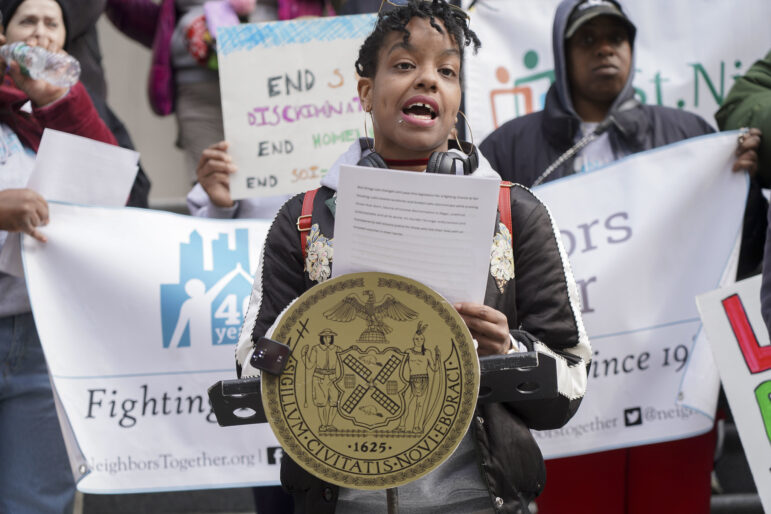Two weeks after Barack Obama became the first African-American elected to the White House, sparking street celebrations as jubilant in Nairobi as New York, staffers of the magazine “Elan: The Guide To Global Muslim Culture” sprang into action. Even though their year-old glossy publication only comes out once per quarter, they decided to put out a special fifth issue. “Given how this historic election was being honored within the Islamic community, it’s something that we couldn’t ignore,” says editor-in-chief Nida Khan. “We didn’t have a lot of time, but we couldn’t let this moment pass us by.”
The result is a hot-off-the-presses special edition featuring a mix of Muslim voices reacting to Obama’s election, including those of Ilyasah Shabazz, a daughter of Malcolm X, and Benjamin F. Chavis Muhammad, the former NAACP head who converted to Islam in 1997. “Muslim World Embraces Obama,” announces the cover, the president-elect’s occasional campaign slight of American Muslims apparently fully forgiven.
It’s a confident move for a new lifestyle magazine with a youthful staff of five, housed in a small office in DUMBO, Brooklyn. With the latest issue, Elan is continuing to define and mine the community of young professional Muslims nationwide. Over the issues, its coverage has spanned from hot-button topics like illegal immigration and the possible ban of Facebook in Egypt, to profiles of people including Imam Khalid Latif, a 25-year-old NYPD chaplain and director of NYU’s Islamic Center, to a look at the planned Guggenheim Museum branch in Abu Dhabi.
The hip and boldly designed magazine is the brainchild of publisher Moniza Khokhar. Born in Saudi Arabia and raised in Chicago and New Jersey, Khokhar graduated from Drew University in New Jersey in 2004 with a bachelor’s degree in economics and political science. Soon after, as Khokhar weighed job offers in Washington, D.C., a chance encounter with a freelance journalist named Candy J. Cooper would inspire her decision to launch the magazine.
“She was really interested in the Muslim-American community,” recalls Khokhar, who also has a master’s degree in Islamic Studies from Columbia University. “We talked about Muslim women, how they felt after 9/11, and all the little idiosyncrasies in the community.” The conversations inspired Khokhar, who is single, to provide reporting and research assistance to Cooper, who wrote a 2006 New York Times article about the complex dating rituals faced by young women in New Jersey’s Muslim immigrant population.
From blogs to chat rooms, the article struck a chord. “It was being forwarded everywhere. People were saying, ‘Finally, someone is representing our community properly,'” remembers Khokhar. “It made me realize there was a gap. Our community needed something bigger to connect with because there was nothing out there where we could go to discuss our issues in a non-judgmental way.”
Khokhar, who says that her family’s business background in the medical industry helped her as she drew up a plan for the venture in 2007, focused her initial efforts on securing financing. “I was fortunate to find a private Muslim-American investor who understood the importance of this,” says Khokhar – though the benefactor and the sum provided go unspecified. “I really had to make a pitch and beat my head against the wall. But to have a publication financed from the very beginning helped to get it up and running.” Khokhar used the funds to launch her own enterprise, Wahid Media Ventures, to publish Elan’s first issue last February. “In Islam, God has 99 names. Al-Wahid is a name that means ‘The One’ which speaks to the concept of coming together,” she says.
At a time when print publications are folding left and right, having an “angel” investor is certainly a rare piece of luck. But Khokhar still had plenty to learn, and she reached out to contacts in academia and media for advice. “Whatever I didn’t know, I had to figure out,” she says. “When I didn’t know distribution, I had to figure that out. Or when I had to figure out the whole subscription process. It was just one thing after another.” Though official numbers aren’t yet available, Khokhar claims a circulation of 10,000 in the U.S., with 5,000 in London and Dubai.
Available at big bookstores such as Barnes & Noble and Borders in the five boroughs and other cities nationwide, Elan blends its reporting of contemporary Islamic culture with a wide-ranging assortment of socio-political issues, including subjects steeped in controversy. Last May, Dunkin’ Donuts removed an advertisement from its Web site after conservative bloggers complained that a black-and-wife scarf worn by celebrity chef Rachael Ray resembled a kaffiyeh, the traditional Middle Eastern scarf that has long symbolized Palestinian nationalism and is now a fashionable item both inside and outside the Muslim community.
~
In response, the Fall 2008 issue of Elan highlighted the work of Chicago-based activist Nadia Sulayman, whose blog features photos of more than one hundred kaffiyeh-clad Muslims nationwide holding Dunkin’ Donuts cups. That issue’s cover also featured a digitally-enhanced image of the Lincoln Memorial adorned in a brightly-colored kaffiyeh. “Palestine is a major issue in the Muslim-American community, but the kaffiyeh has come to symbolize something greater,” explains Khokhar. “We wanted to use imagery that would bring home the point that Muslims are here and that we’re a major voting bloc.”
While there are no firm independent statistics on the number of Muslims nationwide – the U.S. Census Bureau is legally prohibited from collecting data on religious affiliation – Elan joins an emerging crop of glossy magazines catering to the Muslim-American population, including Muslim Girl, America’s Muslim Family, and Islamica. There’s also an array of youth-oriented blogs popping up, including one dubbed The Official Muslim Blog run by the Brooklyn-reared Saad Ahmad Rashad, whose commentary tackles everything from the ongoing crisis in Gaza to the health risks associated with tattoos.
Elan’s breezy, urban-chic approach is reminiscent of other culture magazines like The Source, a longtime chronicler of hip-hop culture, or the younger Heeb, aimed at “plugged-in and preached-out” Jews. But a makeover is already underway. “We’re constantly evolving to find our niche,” says Carolina Wahnish Rivera, Elan’s creative director. “We’re going for a more simplistic and sleek appearance that places a stronger emphasis on the stories and the photography.”
Yet the desire to chart a new creative course may also be attributed to the magazine’s immediate surroundings inside a trendy and artistic Brooklyn enclave. “It’s a creative hub. The energy is perfect for us,” notes Khan. “It’s not like we’re bunched into some stuffy corporate office where we can’t be ourselves.” And the well-known Arab and Muslim immigrant population in downtown Brooklyn, whose shops fill the streets adjacent to the major Flatbush and Atlantic Avenue intersection, are another resource. “Brooklyn is exciting. It’s very conducive to the creative process. And the people certainly give us instant feedback on what we’re trying to do,” Khokhar says with a laugh.
Both Khokhar and Khan, who have traveled to the Middle East and South Africa, respectively, envision the magazine as a venue for shattering stereotypes. A number of Elan’s main contributors, from its core of freelancers based worldwide to Rivera, the creative director, are non-Muslim. Born in Argentina, Rivera is a Jewish American of Moroccan ancestry. “I think that I bring a different point of view. Sometimes, I don’t see things the same way that Moniza and Nida do, but we come to a middle ground,” says Rivera, who grew up with Khokhar. “And that’s what this magazine is trying to do – using culture to find common ground.”
And with Elan’s editorial staff led by twenty-something women, Khan argues that the magazine’s composition challenges how gender roles are perceived. “A lot of people assume that being a Muslim woman means that you’re oppressed,” she says. “But Muslim women are actually very strong.” One challenge, Khokhar concedes, that Elan had to overcome is appealing to a broad demographic. “How do you represent Muslims with Indonesian, Pakistani and Egyptian heritages in the same place?” she asks. “My argument has always been ‘Why not?’ Unity in diversity is a concept in Islam. God could have made us all from one tribe, but he didn’t. It’s about embracing diversity.”
Confident that her magazine will survive, Khokhar cites foreign distribution as a lucrative strategy, adding that Elan is now available abroad in Toronto, London and Dubai. Among those who have advertised in Elan is the reggae label VP Records, publisher Simon and Schuster, and Etihad Airways, the national airline of the United Arab Emirates. Still, Khokhar acknowledges that garnering a consistent slate of leading advertisers won’t be easy. “It’s an uphill battle to get your magazine’s message to connect with what advertisers are looking for,” she says. “But you win some and you lose some. Our generation is appealing and it’s untapped. They can’t get to this market through anyone else.” Adds Khan: “At the end of the day, we’re not promoting a specific agenda. We’re bringing something fresh and exciting.”
On the eve of the inauguration, Khan is preparing to travel to Washington, D.C. to file a report for Elan’s website while also planning the next issue, which will explore Islam and hip-hop. To her, the recent election underscored the relevance of the magazine and the Muslim community as a whole. “The only time we heard Muslims mentioned was when someone on the right was trying to brand Obama as un-American or when someone on the left denied Islam to the point where being Muslim was supposed to be a bad thing.” she says. “But I have a lot of non-Arab friends who are also Muslim. Whenever I show them Elan, the first thing they say is ‘it’s about time.’”








